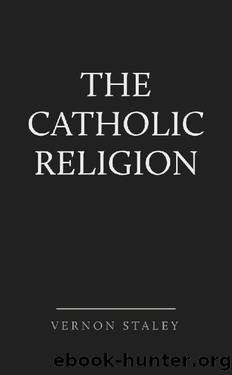The Catholic Religion: A Manual of Instruction for Members of the Anglican Church by Vernon Staley

Author:Vernon Staley [Staley, Vernon]
Language: eng
Format: epub
Published: 0101-01-01T00:00:00+00:00
Chapter II. The Commandments
GOD has endowed man with the great gift of freewill, by the exercise of which he is able to choose good or evil. In order to help man to a right choice, God has given to him the further gift of conscience. Conscience is the inward monitor directing man what to choose, and what to reject. Without conscience, freewill would be a most dangerous gift. Conscience, like freewill, is a natural gift, which everyone possesses. But conscience needs educating and enlightening, otherwise it may deceive us. We often see persons acting conscientiously, yet acting wrongly. It is the work of grace and truth to enlighten and direct the conscience, and to strengthen the will to follow its dictates, Truth is the light of God illuminating the conscience, and grace is the power of God bracing the will to obey the truth.
For the enlightenment of conscience, God has made known his law of right and wrong. We know the law of right and wrong as the moral law. The moral law is contained in the Ten Commandments. There is no wrong of any kind against which the Commandments do not warn us; and there is no duty, either towards God or towards man, which may not be implied from them.
The Commandments were given on two occasions by God himself, and each time from a mount. It was on Mount Sinai that He delivered the moral law to Moses to teach to the chosen people. It was in the Sermon on the Mount that Jesus Christ again laid down the divine law, giving it a fuller and wider meaning. The chosen people received the law of God written on two tables of stone. Christians have received the law of love written by the Holy Ghost in their minds and hearts (Heb. viii. in). Our Lordâs explanation of the Ten Commandments is found in the fifth, sixth, and seventh chapters of the Gospel according to St. Matthew.
There are two ways of regarding the Commandments. They are to be regarded as positive and as negative at the same time; that is to say, each of the commandments enjoins as well as forbids, teaching both what is to be done, and what is not to be done. âThou shalt do this,â implies âThou shalt not do that;â and Thou shalt not do this,â implies âThou shalt do that.â By this is meant that where a virtue is commanded, the opposite vice is condemned; and where a vice is forbidden, the opposite virtue is enjoined. It is to be observed that although the Commandments were originally given to a nation, yet each of them is addressed to individuals,â âThou shalt,â or âThou shalt not.â By this we are taught that the keeping of the Commandments is a personal matter, in which each individual is concerned.
Godâs law is not an arbitrary law. It could not have been other than it is, because the distinction which it points out between right and wrong is an eternal distinction, rooted in the being of God himself.
Download
This site does not store any files on its server. We only index and link to content provided by other sites. Please contact the content providers to delete copyright contents if any and email us, we'll remove relevant links or contents immediately.
What Is the Gospel? (Foreword by D. A. Carson) by Greg Gilbert(980)
Jesus in Me by Anne Graham Lotz(906)
Daily Strength: Devotions for Bible Believing Study by Douglas Stauffer & Andrew Ray & Rick Quatro(890)
Christian Ethics by Wilkens Steve;(850)
The Practice Is the Path by Tias Little(811)
New Morning Mercies by Tripp Paul David(793)
Cleaning Up Your Mental Mess by Dr. Caroline Leaf(729)
Veritas: A Harvard Professor, a Con Man and the Gospel of Jesus's Wife by Ariel Sabar(718)
Greatest Mystery in the World by Og Mandino(647)
The Creative Call by Janice Elsheimer(592)
No More Christian Nice Guy by Paul Coughlin(573)
Our Appointment with Life by Thich Nhat Hanh(563)
Monastic Archaeology by Unknown(554)
2084 by John C. Lennox(548)
This One Wild and Precious Life by Sarah Wilson(531)
Jesus--Awesome Power, Awesome Love (Discover 4 Yourself® Inductive Bible Studies for Kids) by Kay Arthur(524)
The Duties of Parents by J.C. Ryle(503)
The Catholic Verses: 95 Bible Passages That Confound Protestants by Dave Armstrong(500)
The Tale of the Tardy Oxcart (Swindoll Leadership Library) by Swindoll Charles R(484)
